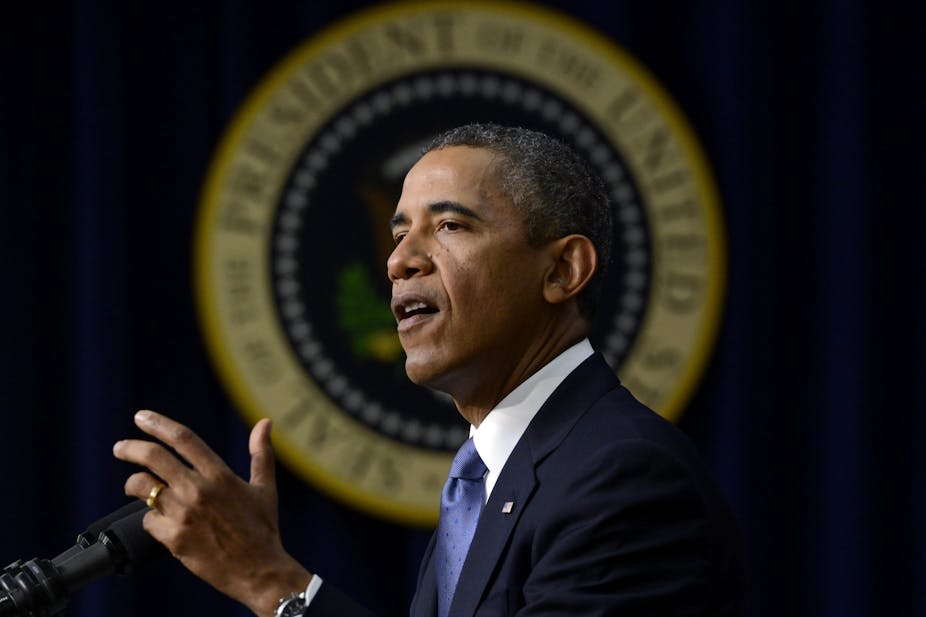Being the most powerful man in the world isn’t what it used to be. US president Barack Obama is currently being ridiculed for his apparent inability to decide how to handle the conflict in Syria. American power, critics argue, is being squandered and actively undermined by a prevaricating president who emboldens his enemies. What we need, the argument goes, is more a decisive and consistent approach to foreign policy.
Such analyses are a misleading, but heady cocktail of nostalgia, wishful thinking and a misplaced faith in the remedial potential of military power. They are also a painful reminder that the only thing we learn from history is that we don’t learn anything from history.
The contrast between Obama and his predecessor is striking and, remarkably enough, is not one that necessarily favors the incumbent. George W. Bush famously described himself as “the decider”. Bush’s great advantage in this regard was that he could make decisions untroubled by any awareness of complex contingent circumstance or the possible lessons of history.
The fact that no-one has ever succeeded in subduing Afghanistan, for example, gave no pause for thought to the neoconservative grand strategists of the Bush era. Belief in the righteousness of the cause and efficacy of overwhelming force would ensure success for a leader bold enough to size the moment.
The intervention in Iraq is likewise a continuing reminder of the follies hubris can inspire. It is not necessary to catalogue the immense death and destruction that has ensued to make a simple point: who now thinks it was worth it? What strategic objective was achieved? Even more pointedly, what humanitarian cause was served by an intervention that directly undermined America’s material power and influence in the world?
The American people are understandably nervous about getting involved in yet another conflict - this time, in Syria - which seems to have little immediate relevance to them and no obvious measure of success. In such circumstances, any leader might think twice before inflicting yet another potentially draining, open-ended military struggle on a war-weary population.
But to Obama’s credit there would seem to be more than a simple calculation of electoral advantage at work here. Obama is, after all, a second term president who will not have to face the voters again. He plainly doesn’t want his legacy to be yet another unresolved conflict in the Middle East in which the goals are unclear much less achievable. Prevarication in such circumstances is not only understandable, it is actually praiseworthy.
But, the critics will say, the United States has an historic mission and a special responsibility to maintain order in the international system. Perhaps. But Obama also recognises that international action may be more sustainable in the long-run if it has both domestic and international support. Legitimacy may be hard to measure, but the invasion of Iraq is a reminder of what disillusion and division its absence can cause.
There may be an even more compelling reason for hesitating on the brink of action, however. To act and to unambiguously fail would not serve any American interest and it would certainly not do anything for the troubled peoples of Syria. Not only would the US be revealed to be a diminished and impotent titan yet again, but it would also shine a revealing and unwelcome light on the underlying realities of the contemporary international system.

Where is the much-invoked but seldom identified “international community” in all of this? The dispiriting reality is that there is no such thing, of course. True, it may be possible to round up the usual suspects in ad hoc coalitions of the western willing, but this is hardly an international community. Expecting America to do the heavy lifting in trying to impose order when the divisions between friend and foe are unclear and the ultimate goal remains undefined is a recipe for disaster.
Britain’s decision not to become involved in the Syrian conflict may have helped avert another high profile Anglo-American collaboration, the only certain outcome of which would have been confirm resentments about the asymmetrical nature of international power.
There may, indeed, be much to be said for confronting despots. But before deciding to add to the growing mounds of the dead, a little rumination doesn’t seem unreasonable. Killing people, even strangers at a distance, is not something that should be undertaken lightly. It is worth remembering that some people are alive today who would undoubtedly be dead if the pro-war lobby had prevailed. Whether chemical weapons are any worse than state-of-the-art missile technology in this regard is a moot point.
One thing is clear though: even in the unlikely event that military action can determine the outcome in Syria, it would be a Pyrrhic victory at best. At some stage a political agreement will have to be reached. This applies at the international level, too. The Americans may not like them much but we all have to recognise that if there is an international community, the likes of Russia are presumably part of it too.
The institutions of international diplomacy may be notoriously feeble. Negotiations may be tedious, drawn-out and inconclusive. But negotiations don’t kill people. As Winston Churchill famously pointed out, jaw-jaw is better than war-war. If this is what prevarication and weakness looks like, let’s have more of it.

